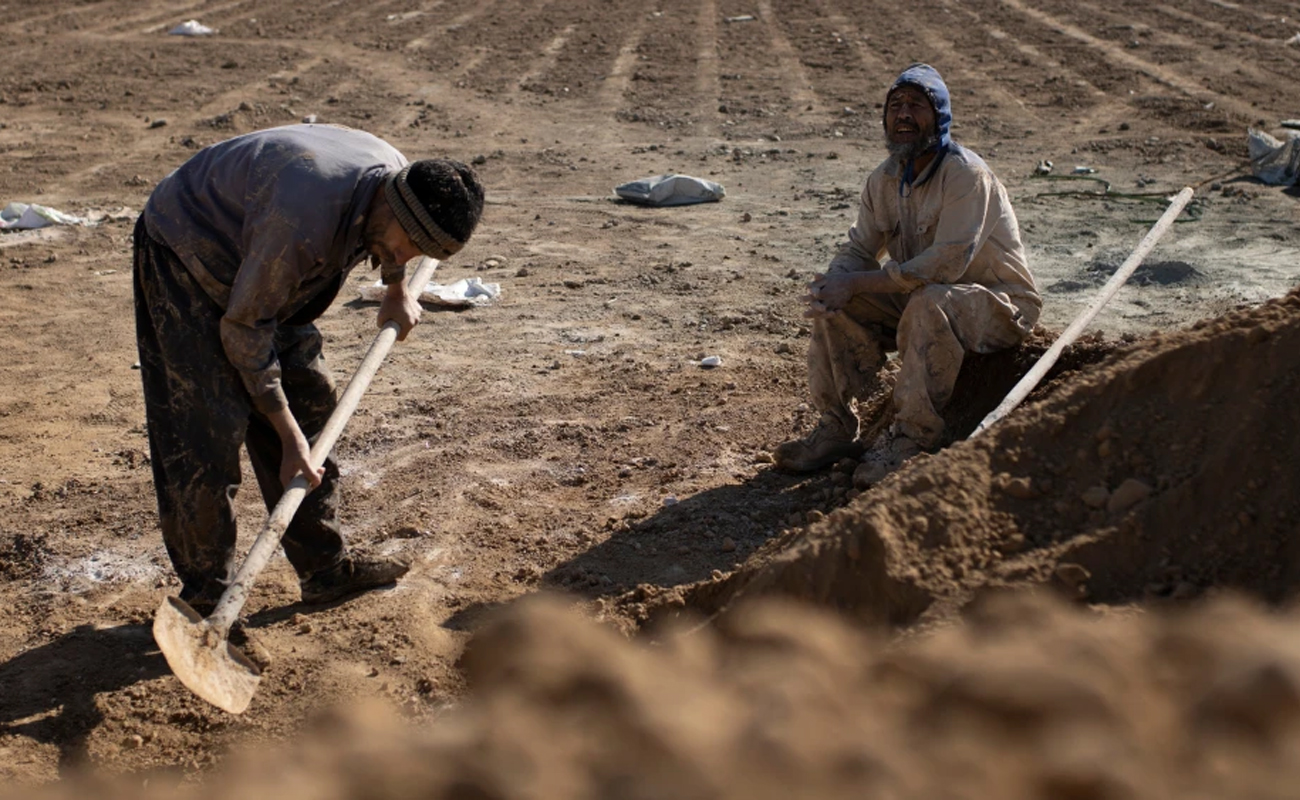Iran Scapegoats Afghan Refugees After Israel Conflict
Photo Credit: Afghan immigrant workers at a cemetery in Tehran, Iran. | Shutterstock
By Dr. Davood Moradian
A Mass Deportation and Intensified Anti-Afghan Sentiment Are Placing Afghans in Iran in Peril
The ceasefire between Iran and Israel elicited a collective sigh of relief from millions of citizens in both nations; however, it has led to severe repercussions for tens of thousands of Afghan refugees residing in Iran. In one of the most significant mass deportations in recent history, Iranian authorities have forcibly repatriated over 120,000 Afghans to Taliban-controlled Afghanistan. Anti-Afghan rhetoric among certain segments of the Iranian cyber community has accompanied this action. A legal firm has announced that it no longer will provide services to Iranian Jews and Afghan refugees due to their purported involvement in facilitating Israeli assaults on Iranian targets. At the peak of hostilities, Iranian state media aired the interrogation of an alleged Afghan spy by the Chief of the Judiciary and the Chief Police Commander of Tehran, who accused the individual of delivering the location of Iran’s state Radio and Television headquarters to Israeli operatives via WhatsApp.
Such public accusations have put Afghan refugees in Iran under suspicion. The mass deportation and escalating anti-Afghan sentiment exacerbate the precarious situation of Afghans in Iran.
Millions of Afghans have fled as refugees into Pakistan and Iran since the initial Soviet invasion in 1979.
Millions of Afghans have fled as refugees into Pakistan and Iran since the initial Soviet invasion in 1979. The Taliban’s return to power in 2021 catalyzed a renewed refugee flow. According to United Nations reports, approximately eight million Afghans, nearly a quarter of the population, have fled the country since 2021, with estimates suggesting that between three-to-five million have sought refuge in Iran in recent years, one of the most significant migration trends in recent history. While Afghanistan’s Western allies struggle to absorb fewer than half of the millions displaced, Iran’s initial open-border policy provided support to Afghans escaping the Taliban’s regime of terror, oppression, and poverty.
Despite operating under a sanctioned economy and enduring international isolation, Iranian society and its economy have largely remained welcoming to Afghan refugees. Key sectors, including agriculture, construction, mining, and services, dependon Afghan labor and entrepreneurial spirit. Although Iran denies Afghan refugees basic rights such as pathways to citizenship and property ownership, Afghans have established informal communities inside Iran. Prior to the recent Israeli attacks, public opinion regarding Afghans’ status in Iran was polarized. While some Iranian scholars and commentators, as well as many in the Ministry of Foreign Affairs, advocated for a more humane approach towards Afghans, hardliner factions called for mass deportation. Interestingly, some Iranian opposition activists have joined the hardliners’ stance, asserting that the Iranian government uses Afghans to suppress its own citizens. These opposition activists allege that the regime intends to expand the Fatemiyoun Brigade, an Afghan proxy force trained by the Islamic Revolutionary Guard Corps in Syria, to counter future uprisings by Iranians against the regime.
Heightened suspicions regarding Afghan refugees’ potential ties to the Iran-Israel conflict have placed them in a vulnerable position.
The alleged involvement of a small number of Afghan refugees in facilitating Israeli attacks has bolstered the arguments of those seeking Afghans’ mass deportation. The global climate surrounding refugee issues, exacerbated by the Trump administration’s abandonment of U.S. refugee programs, has further marginalized advocates for refugee rights. Heightened suspicions regarding Afghan refugees’ potential ties to the Iran-Israel conflict have placed them in a vulnerable position. The forced deportation of hundreds of thousands of Afghan refugees from neighboring countries would strain Afghanistan’s already fragile socio-economic conditions. The current clerical junta in Kabul lacks both the capacity and intention to address Afghanistan’s myriad challenges. Meanwhile, United Nations agencies remain overwhelmed, underfunded, and bloated.
Since the Islamic revolution in Iran in 1979, Afghanistan has been intricately linked with Tehran’s ideological and geopolitical ambitions. As both the U.S./Israel and Iran evaluate their respective strategies, including the prospect of resuming military operations or making the “deal of the century,” Afghan refugees—among the most vulnerable groups in Iran—once again may feel the brunt of conflict or peace dividend.
The article was first published in the Middle East Forum on July 1, 2025.
Dr. Davood Moradian is the Director-General of the Afghan Institute for Strategic Studies and a Former Senior Policy Adviser at the Ministry of Foreign Affairs. He tweets @DrMoradian1.
Academicians and Officials interested to publish their academic pieces on this page, please approach us through: contact@aissonline.org.
The article does not reflect the official opinion of the AISS

